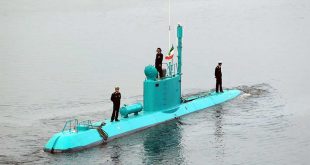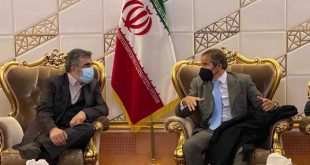Alwaght– The occupied Palestinian territories are immersed in waves of concerns and intimidation and the Israeli military forces were put on high alert after Israeli drone violation of Lebanon’s airspace last week and Hezbollah leader Sayyed Hassan Nasrallah’s strong-toned warning that the violation will not go without response and that the Israelis should expect the Lebanese retaliatory reaction in the coming days.
The Israeli Prime Minister Benjamin Netanyahu, extremely worried about the potential developments, has strengthened his tone about Tel Aviv’s actions should the Lebanese movement want to retaliate. Netanyahu addressed the Israeli settlers of the north telling them that they should feel comfortable because there would be no retaliation by Hezbollah. The assurances were met by counter-comments by Sayyed Nasrallah who said a response is “certain and destructive”, although the movement is not in a haste. Hezbollah’s threats raised a question: When and where will Hezbollah realize its threat of reaction? The question occupies not only the Israelis’ minds but also the regional people’s as regional nations are confident Nasrallah’s promises are all certain when it comes to materialization.
Downing the modern Israeli planes
One of the most possible reactions to the Israeli violation can be an effort to punish Tel Aviv in a way that the Israeli planes will no longer dare to audaciously violate the Lebanese airspace. Over the past few years, Israeli fighter jets repeatedly flew over Lebanon to strike positions in neighboring Syria. To date, this violation of the Lebanese sovereignty remained not responded, motivating the Israelis to do it continuously. On August 21, the Lebanese government raised the case with the United Nations. At a meeting, Lebanon’s permanent representative in comments said that just unlike Beirut’s show of commitment to the resolution 1701, Tel Aviv violates the Lebanese sovereignty on a daily basis without being condemned internationally.
Hezbollah’s chief on Friday said that the “resistance can shoot down four to five fighter jets so that it can disrupt and restrict the Israeli intelligence-gathering power.” He added that “we do not waste out offensive and qualitative arms on the drones.” Nasrallah appears to have talked about a still-not-unveiled advanced air defense system at the movement’s disposal capable of shooting down the intrusive Israeli jets.
Two points need to be taken into the account. First, Iran, as a key ally to Hezbollah, has managed to take crucial steps to develop a wide range of radar and air defense systems to protect its skies in a context of sanctions. Tehran managed to bring down the state-of-the-art US spy drone “Global Hawk” using one of its home-developed air defenses dubbed “3rd Khordad”, or “Raad” formally. So it is highly likely that Lebanon and Syria have turned to Iran to develop modern air defenses in the face of the Israeli strikes.
Once the modern Israeli fighter jets are downed in the Lebanese airspace, Hezbollah’s opponents at home and abroad will lack a justification to question its actions as the Israeli violations provide the Lebanese movement with full legitimacy to strike back. The Israelis on the other side will be incapable of launching anti-Hezbollah media propaganda and playing victim to cover up their hostilities. Such a retaliation, as Hezbollah’s secretary-general put it, will not trigger a war because shooting down intrusive aircraft is globally recognized as a defensive action.
Drone attacks on sensitive military and economic sites
Yet another retaliatory action against the Israeli regime can come in the form of drone strikes. The Axis of Resistance, led by Iran and stretching to cover Iraq, Lebanon, Syria, Palestine, and Yemen, has made triumphant advances, like in missile sector, in production of intelligence and combat drones. An example is the game-changing combat drones used on a daily basis by Yemeni forces to launch attacks on Saudi Arabia in response to heinous crimes by the Saudi-led Arab coalition in Yemen.
In his speech delivered at the second anniversary of cleansing Lebanon’s Arasal region of ISIS terrorists, Nasrallah said that the time the Israeli fighter jets could comfortably enter the Lebanese airspace and strike the positions they wanted and the Israeli regime in occupied Palestine was safe has gone now. Use of suicide drones to hit sensitive militant and economic sites in addition to material damages can send waves of horror inside the occupied territories in a way that the settlers will tend to vote in the coming elections to politicians critical of Netanyahu actions.
Fadi al-Sayed, the head of United Ummah Strategic Research Institute in Lebanon said that one Hezbollah tactic in retaliation could be sending into the occupied territories the suicide drones. Al-Mayadeen news network, a Lebanon-based broadcaster, has recently reported that the Israeli military has increased Iron Dome missile interception batteries in the north in an obvious signal of fear from Hezbollah’s drone and missile strikes.
Operations deep into the occupied territories
Many analysts agree that Netanyahu’s violations against Syria, Lebanon, and Iraq are not a deterrent measure and will not be of avail to the promotion of the Israeli security but also are a show move the PM makes to cover up his defeats in the confrontation of the Resistance camp in more than one regional front. In early December last year until mid-January, the Israeli army launched its Operation Northern Shield to destroy Hezbollah tunnels claimed to have been dug from Lebanon to the occupied territories. The move was read by experts as a demonstration measure by Netanyahu to assure the Israeli voters of cutting Hezbollah capability to carry out attacks in the Israeli territories.
An operation into the depth of the Israeli regime can cast aspersions on Netanyahu who with claims of destroying the tunnels and striking the arms convoys in Syria bound to Hezbollah seeks to promote the increased security at home as his win card in the upcoming parliamentary vote.
 WILAYAH NEWS VOICE OF THE GLOBAL AWAKENING
WILAYAH NEWS VOICE OF THE GLOBAL AWAKENING






